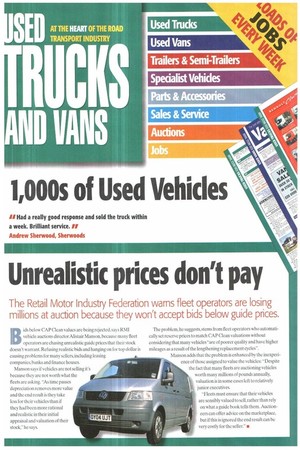Unrealistic prices don't pay
Page 69

If you've noticed an error in this article please click here to report it so we can fix it.
The Retail Motor Industry Federation warns fleet operators are losing millions at auction because they won't accept bids below guide prices.
Bids below CAP Clean values are being rejected. says RMI vehicle auctions director Alistair Manson, because many fleet operators are chasing unrealistic guide prices that their stock doesn't warrant. Refusing realistic bids and hanging on for top dollar is causing problems for many sellers, including leasing companies, banks and finance houses.
Manson says if vehicles are not selling it's because they are not worth what the fleets are asking. "As time passes depreciation removes more value and the end result is they take less for their vehicles than if they had been more rational and realistic in their initial appraisal and valuation of their stock," he says. The problem, he suggests, stems from fleet operators who automatically set reserve prices to match CAP Clean valuations without considering that many vehicles "are of poorer quality and have higher mileages as a result of the lengthening replacement cycles". Manson adds that the problem is enhanced by the inexperience of those assigned to value the vehicles: -Despite the fact that many fleets are auctioning vehicles worth many millions of pounds annually, valuation is in some cases left to relatively junior executives.
"Fleets must ensure that their vehicles are sensibly valued to sell, rather than rely on what a guide book tells them. Auctioneers can offer advice on the marketplace., but if this is ignored the end result can be very costly for the seller." •


































































































































































































